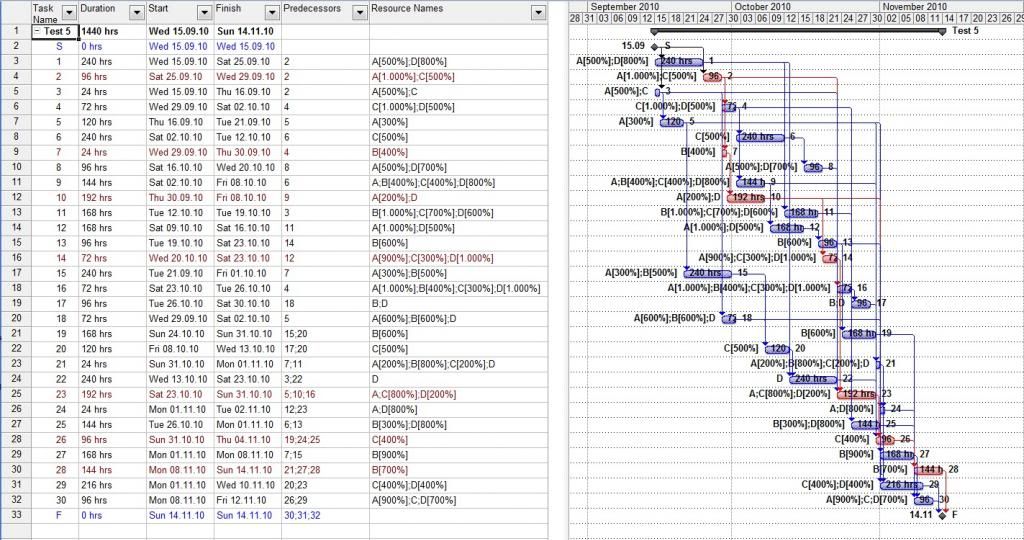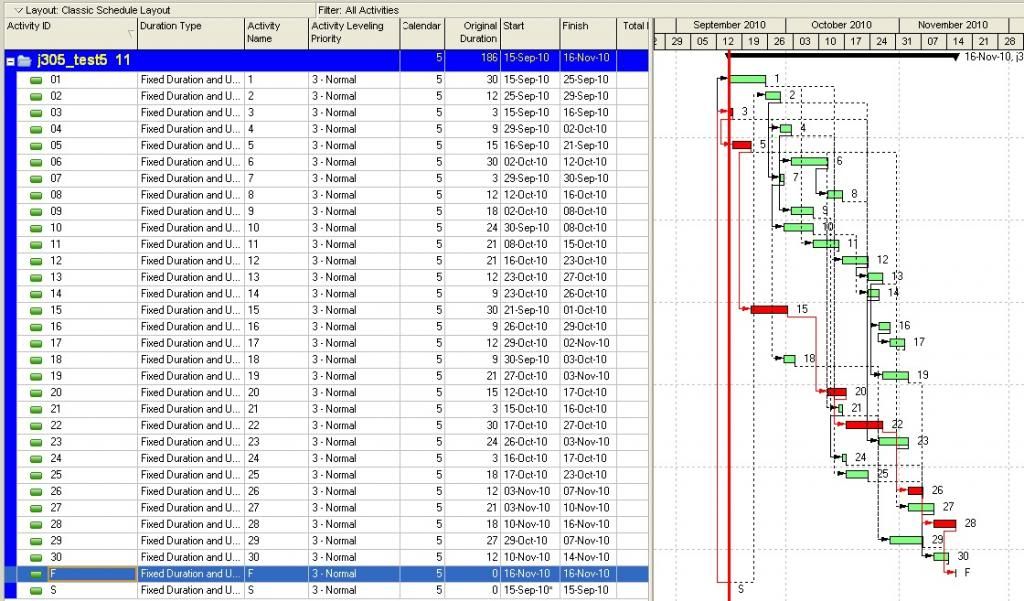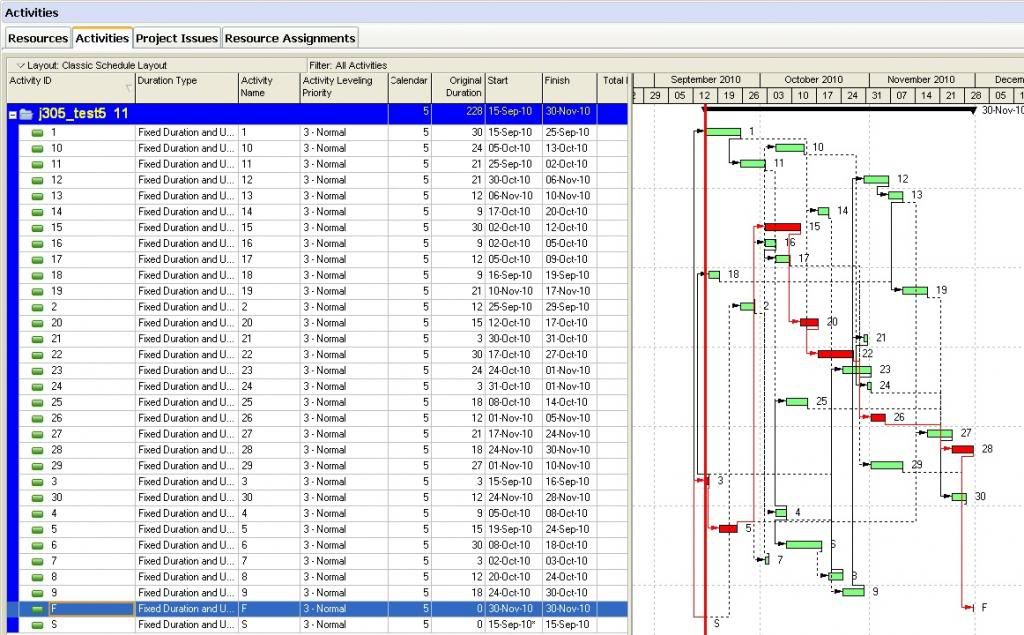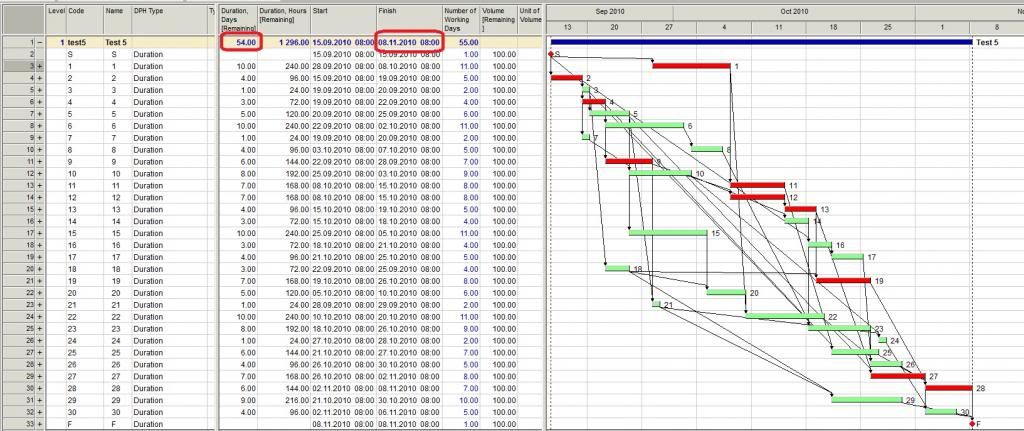Dear all,
I have been using MS Project for a while and now have allocated some time to look at other programs. As a part of this investigation I compared resource leveling algorithms of them (I am one of those, who believe, that resource leveling is very important for the scheduling software).
So, I just want to share my results. I also welcome your comments. As this is related to several tools, I am posing this here in a none-tool specific part of the forum.
Tools compared:
- Spider Professional
- Asta Powerproject v11 (only one test, as demo version does not allow big scjedule)
- Primavera P6 R8.2
- MS Project 2007
- MS Project 2010
Tests conducted
I have done resource leveling on the following 2 schedules
1) Intuitive simple 4 tasks and 2 resources schedule, which I call for myself “Vladimir Liberzon Leveling Test”.
You can see the schedule here:
2) Schedule j305_test5.001, which Iwas also kindly created for me by Vladimir Liberzon, based on one of the problems from the library of Resource-Constrained Project Scheduling Problems (RCPSP), made available by Technical University of Munchen.
For this schedule I noticed, that Primavera produces different results, depending on the sequence of events (depending on which Activity ID has been chosen for a task). Therefore to make a correct comparison I have also done testing with the other programs using 2 different sequence of activities.
You can get this schedule in formats of Spider Project, MS Project and Primavera XER file
https://drive.google.com/drive/folders/0B1FBt_G3gCVqSHRJdWFBWHR3LWM?resourcekey=0-VJfczlZVP4OFcSGSnXc9vA&usp=sharing
How testing was done:
I would run standard resource leveling without any priorities. So effectively the tool was supposed to find the shortest possible schedule, without looking at task priorities.
For “Vladimir Liberzon Leveling Test”, if the tool would produce human-like result, then the test would Pass, otherwise it would fail. (Human can easily see, that to avoid resource overloading, Task3 shall be delayed by a day.)
Results:
Results are presented in the table below:
Note: for test j305_test5, the results are shwon in calendar days.
| | Spider Project
(optimisation plus mode) | Spider Project
(standard mode) | Asta Powerproject | Primavera P6 R8.2 | Microsoft Project 2007 | Microsoft Project 2010 |
|---|
| "Vladimir Liberzon Leveling test" | Pass | Fail | Fail | Pass | Fail | Fail |
|---|
Schedule
j305_test5
(1st sequence of actions) | 54 | 60 | Not tested
(schedule does not fit demo version of Powerproject) | 62 | 60 | 65 |
|---|
Schedule
j305_test5
(2nd sequence of actions) | 54 | 60 | Not tested
(schedule does not fit demo version of Powerproject) | 76 | 60 | 65 |
|---|
Conclusions & observations:
- It looks like relative place of a tool depends on which schedule it is tested on. E.g. Primavera produced better results than MSP on the 1st test, but worse results on a second test.
- Surprisingly for me Primavera did not do so well:
The schedule duration was dependent on the Activity ID, which has been chosen for a task.
Even shortest Primavera schedule was still longer then the ones of Spider and even Microsoft Project. - For the test j305_test5.001 only Primavera showed dependence of the sequence of activities.
- Surprisingly, MS Project 2010 produced worse results, that 2007. I did not test 2013, but based on Vladimir’s report, MS project 2013 is even worse in this sence.
- Spider Project is undoubtedly a winner so far in this competition.
Appendixes
MS Project 2007 results screenshot

Primavera results screenshots
Sequence 1

Sequence 2

Spider results (optimization plus mode).











Replies